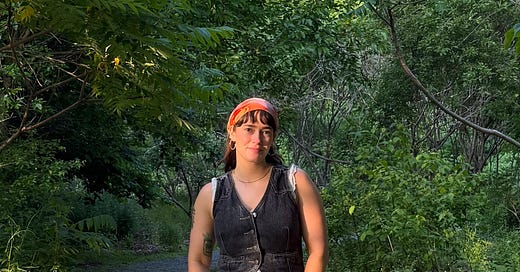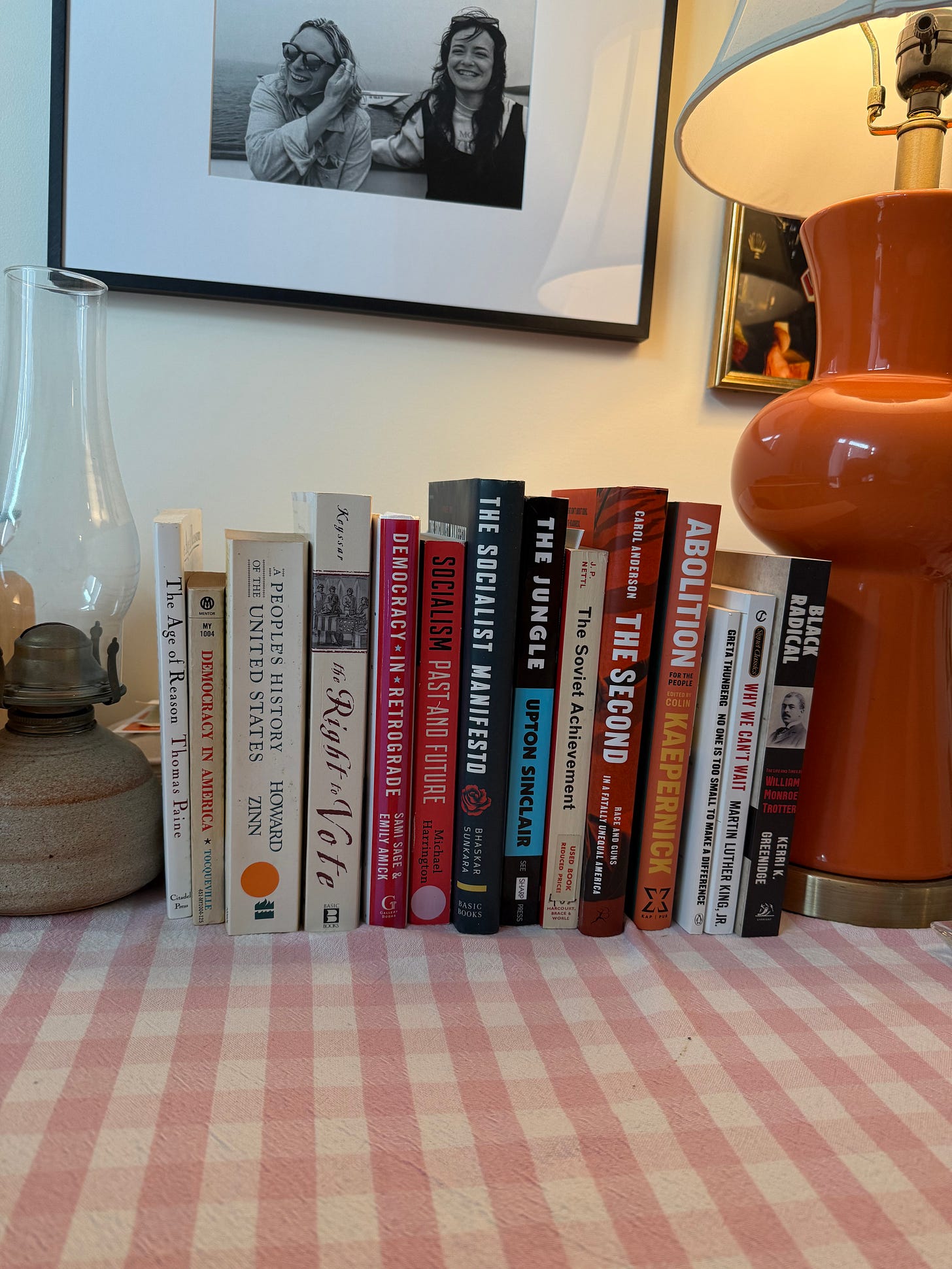These opinions are my own. Estimated reading time: 8 minutes.
My political identity has always been the progressive left. I was raised in a “liberal” family where my direct family (parents, two brothers, and a sister), as well as my extended family (the ones that we saw regularly) would all likely identify as democrats.
As early as the 8th grade, I started to realize that my political identity was on the fringes when, in a social studies unit where communism was mentioned with a negative connotation, I remember thinking that the concept of providing every resident with the resources they need to live sounded like a good idea. Maybe the idea wasn’t wrong, it had just never been implemented correctly. I remember thinking, “if there are people who can’t afford housing, food, or water, we should just give it to them”. Even now— more than 15 years later— my political ideologies come from a belief that people should be given the resources to live their life. In fact, my LinkedIn bio says: “I am a Boston-based activist, community organizer, abortion doula, and community builder who believes that everyone should be provided the resources to live their lives with access to housing, food, education, community, clean air and water, healthcare, and moments of joy and entertainment.”
I studied social work in college, which was where I got my start in understanding policy. Students were required to take two “policy” social work classes as part of the social work program, and I learned not only about the legislative process of how a bill becomes a law & the implementation of policy, but also about different systems of oppression and how they can show up in the writing of policy, implementation of policy, and potential unintended consequences of policy.
In one of these classes focused on different policies that have been proposed to undo the inequitable wealth distribution in the U.S.— the top 0.1% of Americans possess nearly as much wealth as the bottom 90%— we did an exercise [1] that was supposed to highlight our inequitable wealth distribution in this country.
The “winner” of the exercise, determined by ending the exercise with the most “coins”, would be given 10 points of extra credit on the next exam. I remember the exercise working like this:
1. Everyone in the class got randomly assigned an amount of “coins” which represented money.
2. The professor ran through different prompts that simulated life changes, economic/stock market changes, or other factors that changed the amount of wealth each individual had. The end of this round left some students in the class with a lot of “coins”, and a large percentage of the class having no “coins” or close to no “coins”.
3. Finally, there was an opportunity for the class to vote for however they wanted the “coins” to be redistributed. Each student was given an amount of votes depending on how many “coins” they had (if you had zero coins, you didn’t have a vote). In our simulation, this ended up meaning that the top four coin holders in the class had the ability to decide the outcome of the election.
[1] For more information on this classroom exercise, this one online seems to be similar.
The result was that the bottom 85% of the class population who had no vote or close to no vote convinced the top four coin holders to equally distribute all of the coins across the entire class, effectively giving everyone in the class 10 extra points on the exam. Our professor kept exclaiming that she had never had this happen before. In fact, I remember her trying to convince the top “coin” havers by saying, “you guys understand that if everyone gets an extra 10 points on the exam, it’ll be the same as no one getting any extra points on the exam.” You’d think the top earners would have taken the money and run, and yet the people prevailed, and everyone was given an equal amount of “coins”.
This was my first real taste of communism in action.
Around Junior year of college, I started attending Democratic Socialists of America (DSA) meetings hosted in a local coffee shop. I quickly realized that every stereotype I had heard about the DSA about how they were “a bunch of white dudes who want to start Marxist reading groups” [2] was pretty much correct. I was frustrated because I wanted to actually do something to help my community, but it felt like DSA meetings were about talking about socialism and Marx rather than actually doing anything.
[2] This is going to be funny later once you realize what the point of this Substack is.
I joined some folks I met through those DSA meetings to organize a rally of about 200 community members after 17 lecturers were fired from UNH despite having a Lecturers Union contract. To me this feels worth noting because while these organizing efforts were not directly related to the DSA, the DSA did connect a group of individuals who worked to organize around issues in their community.
Since attending those DSA meetings in college, my perception of the DSA is not necessarily negative, but rather neutral— I feel like they don’t actually do anything.
Let’s time skip to the Fall of 2023, when I started attending protests and rallies calling for a ceasefire in the genocide in Gaza. These protests were co-hosted by the Party for Socialism and Liberation (PSL). Because of their involvement in these rallies, I created a story in my head about the PSL— they were like the DSA, but that they actually organized in communities. I had been feeling like I wanted to do something, and I started to consider going to PSL meetings to help organize around social issues happening in communities in Boston.
A few months ago, at the Wake up the Earth Festival in Jamaica Plain, my husband and I came across members of the PSL tabling. I mentioned to them that I would be interested in joining meetings to organize with them and we scheduled a coffee date to discuss it in more detail. The day before the coffee date, I thought that I should probably do some actual research on the PSL and I found that they have many beliefs that I just couldn’t get on board with. This included their support of the North Korean government, their stance on Ukraine dating back to 2014, and their stance on the Uyghur genocide in China.
I realized that while I have always thought I align with socialism from the standpoint that I believe that the people with the means (the haves) should redistribute their money to the people without the means (the have nots), I don’t actually know any of the foundational theories that ground different political and economic affiliations like the DSA or PSL. Even broader, I feel like I don’t have the foundational knowledge about the political and economic theories behind social movements like the civil rights movement or the many Latin American revolutions the U.S. has put significant money and resources into overthrowing.
This brings us to now: I am starting on a large personal research project that I will hold myself accountable for through this Substack. I am calling this “My Unofficial PhD: Foundational Theories of Social Movements” with the goal of answering this question: What are the political and economic theories that are foundational of social revolutions and movements across the world?
How it is going to work is that I am going to read foundational texts of political and economic theories like democracy, socialism, capitalism, communism, anarchy, etc. to see what political and economic theories ground different social organizations, social movements, and revolutions.
Before digging into histories of movements, I need to ground in political theory. I have to be honest that it feels overwhelming to start– I don’t really know the right place to start, what the right first book to read is, and so I’m just going to start based on the books that I currently own and what was available at the Brattle (used bookstore in downtown Boston). I’m starting with The Age of Reason by Thomas Paine, and then continuing on with these books (left to right).
I will likely add more books into the docket as these were simply the books I had easy access to. If you have suggestions of books to add, please let me know in the comments!
Another honesty hour– I’m not excited to read these foundational texts. I think they have the potential of being an absolute snooze fest. But! I am going to use this Substack as a way to keep myself accountable and create intriguing content based on the books I’m reading. I’ll make insights and connections between different books and eventually deep dive into how they relate to each other and influence different social movements, social organizations, and revolutions.
At a time when democracy in America feels especially fragile, this project feels especially important. Everyday, we are experiencing just enough oppression to make community members fearful, but not enough oppression to incite revolution. We are at a precipice of monumental change.
Come along with me as I begin this Unofficial PhD!
Did you make it all the way to the end? Let me know! Leave me a comment.




I am excited to be taking this journey with you through your writings and research!